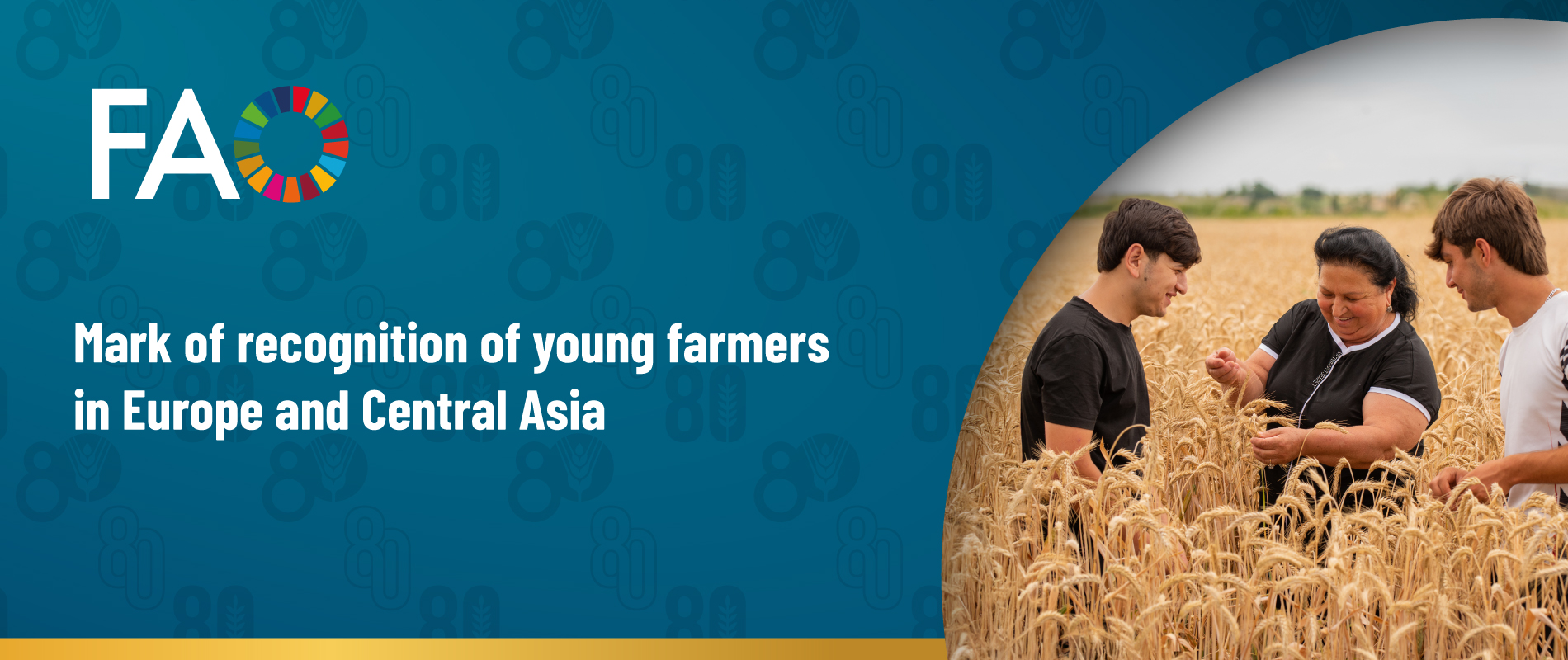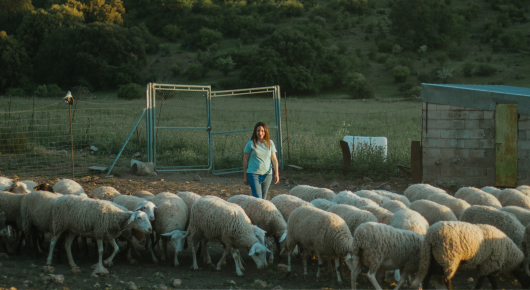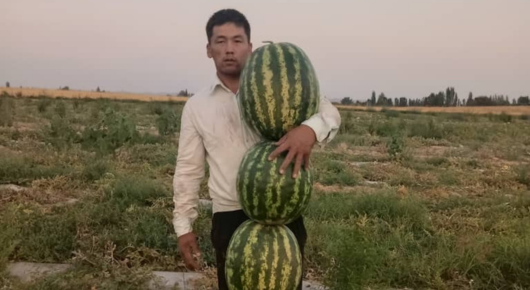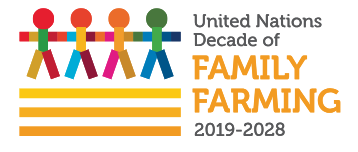
Mark of recognition of young farmers in Europe and Central Asia
Youth are a driving force for more sustainable agrifood systems. The future belongs to them. To unleash their unique potential to rejuvenate the agricultural sector, the Food and Agriculture Organization of the United Nations (FAO) provides specific, targeted support to them to acquire the knowledge and skills needed to innovate, adopt new technologies, and spearhead digital transformation. Youth hold immense potential and are key to achieving better production, better nutrition, better environment and better life leaving no one behind.
In line with the United Nations Decade of Family Farming 2019–2028, FAO’s Mark of Recognition of Young Farmers in Europe and Central Asia is a dedicated effort to spotlight the ingenuity, leadership and positive impact of young farmers who are shaping the present and the future of food and agriculture across the diverse Europe and Central Asia (ECA) region. This initiative goes beyond simply acknowledging their work and commitment to food production; it seeks to celebrate their outstanding contributions to the critical pillars of sustainable agriculture, rural economies, community development, innovation, and the overall transformation of agrifood systems to be more resilient, more efficient and more equitable.
Selected young farmers and youth-led farmers’ organizations will receive certificates as an acknowledgement of their valuable contributions. FAO will also provide a platform for them to share their stories and solutions, that can offer insights and inspiration to peers and other actors alike. The selected farmers will also have the exciting opportunity to participate in other relevant high-profile initiatives and events organized by FAO and its partners.
Contact
Recognition categories
- Innovation in agrifood systems: Recognizes excellence in adopting innovative agrifood technologies and practices that enhance productivity while championing social, environmental sustainability, climate resilience, and biodiversity and ‘interconnect traditional, local knowledge with innovative ideas to become agent of inclusive rural development’.
- Community building: Recognizes young farmers and youth-led farmer organizations that act as catalysts for positive change in their rural communities through leadership, inter-and intra-generational knowledge sharing, and through contributing to local development.
- Inclusion and empowerment: A special recognition will be given to a candidate from any category who demonstrates a remarkable commitment to gender equality, youth empowerment, or the inclusion of marginalized groups in the agrifood sector.
Recognition ceremony
Selected young farmers and youth-led farmers organizations will be announced at the Forty-fourth Session of the European Commission on Agriculture (2–3 October 2025, Budapest). The results will also be highlighted in a session dedicated to the UN Decade of Family Farming at the World Food Forum, an event powered by the global youth, during the World Food Day week in October 2025.

Innovation in agrifood systems – Lourdes Perona López
Lourdes Perona López, an agricultural technical engineer in Spain specializing in livestock and crop farming operations, is pioneering drone and GPS technology in the organic sheep farm she’s running. Thanks to these tools, the farm system can track and monitor each animal in real time – preventing losses, optimizing grazing patterns and reducing the need for manual herding. This allows for the quick detection of issues, such as injuries or predators.
In addition to her innovative spirit, Lourdes is a champion of woman’s empowerment in rural development. As a member of the board of directors of a local rural women’s association, she works to raise awareness of women’s work in agriculture while breaking stereotypes and fostering support networks that drive real equality.

Community building – Ruslan Kubanychbekov
Ruslan Kubanychbekov is a young farmer from Kyrgyzstan. After working at a bank in a city away from home, he returned to farming in his village, eventually becoming a trailblazer in the production of raspberries, watermelons and cherries. He and his family developed an innovative technology for the production of organic fertilizer from manure, allowing them to abandon chemical fertilizers.
Thanks to his encouragement, fellow villagers started their own farms, using environmentally friendly methods of growing fruits and forage crops. As the village grapples with an acute shortage of jobs, leaving many residents seeking work abroad, Ruslan offers temporary jobs during the harvest season to help families improve their incomes.

Inclusion and empowerment – Yevheniia Molchanova
Yevheniia Molchanova, from Ukraine, did not grow up to be a farmer. By profession, she is a mechanical engineering specialist; however, in 2014, she shifted gears and began restoring an abandoned area in her village into a family cottage. Now, she is the founder of a unique and multifunctional space focused on ethical dairy farming and the rehabilitation of both animals and people. Yevheniia readily shares this production model with other farms to increase productivity and reduce environmental impacts in her community and across Ukraine.
Her methods are innovative and holistic, and her mission goes way beyond farming. She offers concrete help through training courses and rehabilitation projects, including the social integration of veterans and low-income people.
Eligibility criteria
FAO invites submissions from young individuals aged 18 to 35 years old who are residents and nationals of countries in the Europe and Central Asia region, as well as youth-led farmers’ organizations from the same region. The initiative seeks to recognize both young women and young men farmers. Nominations for young women farmers are encouraged.
Evaluation criteria
The evaluation was based on the following criteria:
- Innovation: Novelty and creativity of the idea, technology, or practice.
- Impact: Evidence of effective problem-solving and demonstrable positive impact.
- Scalability and replication: Potential for wider adoption, transferability, and catalytic effects (such as increased investment, policy changes).
- Leadership: Meaningful engagement with and tangible benefits for the local community (food security, livelihoods, inclusion, equity). Demonstrated leadership, initiative, and a clear vision for a sustainable future.
- Inclusion and empowerment: Exceptional and sustained commitment to advancing gender equality, youth empowerment, or inclusion of marginalized groups within the agrifood sector.
Future of family farming: Young farmers drive policy innovation for a sustainable future
Audio interview with Lourdes Perona López
